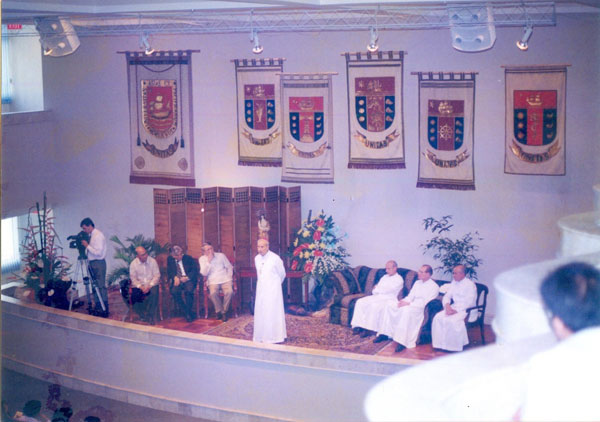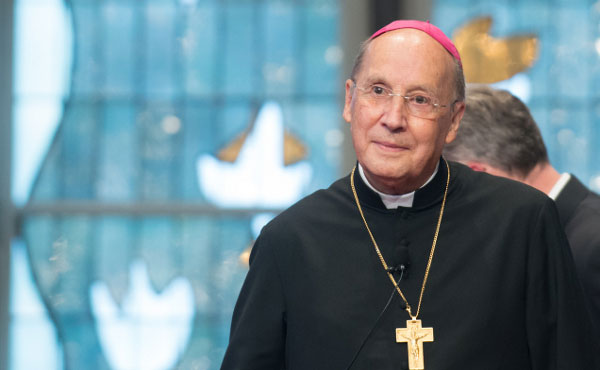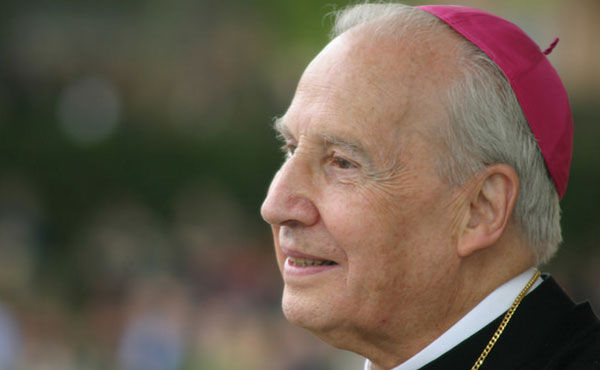Banner photo taken by Dr. Jojo Nicdao
Last December 12, the Honorary Grand Chancellor of UA&P and Prelate of Opus Dei Bishop Javier Echevarría passed away in Rome at the age of 84 because of respiratory insufficiency brought about by a pulmonary illness. He was the second successor of Opus Dei founder St. Josemaría Escrivá.
Bishop Echevarría was born in Madrid on June 14, 1932, the youngest of eight children. In 1948, he met some young members of Opus Dei at a student residence. On September 8 of that year, he asked to be admitted to Opus Dei.
He received a doctorate in canon law in 1953 at the Pontifical University of Saint Thomas (also known as the Angelicum) in Rome, and a doctorate in civil law at the Pontifical Lateran University in 1955. He was ordained priest on August 7, 1955.
He worked closely with St. Josemaría Escrivá until the founder’s death in 1975. When Blessed Alvaro del Portillo succeeded St. Josemaría, Bishop Echevarría was appointed secretary general of Opus Dei and in 1982 was appointed vicar general. After the death of Blessed Alvaro in 1994, he was elected prelate of Opus Dei. He was ordained bishop by St. John Paul II in St. Peter’s Basilica on January 6 of the following year.
As prelate, Bishop Echevarría prioritized evangelization in the areas of the family, youth, and culture. He oversaw the beginning of stable formational activities of Opus Dei in 16 countries, including Russia, Kazakhstan, South Africa, Indonesia, and Sri Lanka. He traveled to all the continents to stimulate the activities carried out by the faithful and the cooperators of Opus Dei. He encouraged the founding of numerous institutions dedicated to immigrants, the sick, and the marginalized. He gave special attention to a number of centers for the care of the terminally ill.

Bishop Echevarría visited UA&P three times: first on January 26, 1987, when he accompanied Blessed Alvaro del Portillo, then Prelate of Opus Dei, to a gathering with some bishops and diocesan priests; and in August 12, 1998 and July 31, 2008 as Prelate and Honorary Grand Chancellor.
Fr. Carlos Estrada, UA&P Vice Grand Chancellor, recounted, “Bishop Echevarría had a great love for the University and was especially concerned about the attention being given to the Management Committee and the Operations Committees, the professors, the administrative staff, and the students. On the two meetings I had with him in Rome, he was interested in what was going on in the University.”
Fr. Estrada thus encouraged everyone to seek Bishop Echevarría’s intercession for all the work done in the University.
Some UA&P employees who have had the privilege of talking to the late Bishop shared with us their stories.
Dr. Roque Carballo, CAS
I lived in Rome from 1973 to 1978 to undergo a more intense spiritual and doctrinal formation. I was 22 years old then. I went there with four other Filipinos.
I first lived for two years in the complex of buildings that is the central headquarters of Opus Dei in Rome, located on 73 Viale Bruno Buozzi. In one of the buildings named Villa Tevere, Bishop Echevarría lived closely with St. Josemaría and Blessed Alvaro. I did not get to see them every day, but frequently we would have get-togethers with St. Josemaría, and he would always be there, caring for his material needs.
On June 26, 1975, St. Josemaría died. There I saw how much Bishop Echevarría was deeply affected by his death. When he appeared in public accompanying Bishop Alvaro, he looked teary-eyed. He surely missed Our Founder so deeply after having lived with him everyday for 25 years.
When Bishop Echevarría visited UA&P on July 31, 2008, he spontaneously commented: “You do not know what you have here in your hands.” He was referring to the great good we can do through this University.
Josette Reyes, HRM
In the occasions I had the blessing to be with him in get-togethers abroad, his eye for detail would stand out. Certainly it is not an eye for the sake of order but out of concern and is a way to reach out. While I was telling him a short anecdote, he noticed that my eyeglasses were at the tip of my nose. He prompted me to align them with my eyes. In another get-together where he gave a talk about apostolic expansion with several other foreigners, I was in the audience. When he saw me, he immediately said that Opus Dei expects a lot in countries like the Philippines. I could have passed for a Korean, Vietnamese, Japanese, or Chinese, while the other Asians in the audience could be mistaken for Filipinas. Truly, only a Father with a heart filled with concern for his children could ever show this eye for detail.

Fr. Emmanuel Garrido, CAS
Bishop Javier Echevarría was an authentic shepherd of souls. The way he lived since getting elected as second successor of St. Josemaría could be characterized by a constant dedication to the Church, the Pope, and this portion of the People of God that is the Prelature of Opus Dei. Although many addressed him frequently as Bishop Javier, for us in Opus Dei he was very much “the Father” who constantly showed us paternal affection, both human and supernatural.
In 1997, while still studying in Rome, I broke a bone in my right forearm and, for almost two months, it had to be in a cast. One day we had a get-together with him. All the more than 200 persons in that gathering wanted to greet him at the end of the get-together, but on his way out of the auditorium, he got busy giving instructions to a professor who was about to leave that day for the University of Navarra. Everybody sensed that it was hard to get a chance to talk to him personally because of the obvious importance of their conversation. Thus, many settled for just kissing his hand. When I had my chance, I took his hand and his finger got to touch my cast. Still conversing with the professor, he glanced toward me to see what he touched, and upon realizing what I had, he did not release my hand. When he was through talking with the professor, he turned to me. “What happened to you, my son?” was his question with sincere concern. I was deeply impressed, wondering how the Father noticed my cast while busy talking with someone. In fact, others hardly noticed it under the sleeve of my coat as I conversed with them. There could be only one explanation: it was the loving attention of Bishop Echevarría for persons. My story did not end there because he even asked for a permanent marker to draw a cartoon duck on my cast, just like what St. Josemaría used to do to his spiritual children who happen to get into the same mishap I had. He drew the duck as a reminder to offer up to God the inconveniences of having to wear the cast.
Grace Liza Concepcion, CAS
I met Bishop Echevarría for the first time when I moved to Rome for postgraduate studies in 1996. I saw him a number of times in big and small gatherings while I was there until 1999. I went back to Rome occasionally between 2000 and 2010. I was quite fortunate to talk to him personally over that period. He was very attentive and remembered things I had written him about. I could see he was concerned with the issues I raised in my letters to him. He was candid, warm, approachable, and affectionate. He was also a very holy person who exuded peace and happiness wherever he went. He was a father to me.

Dr. Veronica Isla, SCM
I had a brief yet intense meeting with Bishop Echevarría after I attended and presented a paper in an international conference on global fashion marketing in Florence in 2009. As far as I could remember, he was extremely busy during that time. Even so, very much a Father, he spoke to me calmly and unhurriedly. I believe he went out of his way to see me for three reasons: I came from a very far country; he recognized the importance of fashion apostolate; and, most important, he knew that his daughter—my sister, an Applied Business Economics Program (ABEP) graduate of UA&P—was sick of cancer. My desire to personally give him my sister’s and my mother’s letters (both had already passed away) encouraged me to seek a private meeting.
As soon as he came out, I made mano po, gave him my pasalubong and the letters, and showed him some family photos, which he blessed. His eyes, filled with concern and affection, were on me the whole time as he spoke to me in Spanish. Although I knew very little Spanish, I listened and looked at him intently, completely lost in the moment. Right after the meeting, the young lady who accompanied me translated what Bishop Echevarría said. He spoke about the importance of the work on fashion. He thanked me and my family—especially my sister—for praying for him and his intentions. He asked me to tell my sister that everyone in Opus Dei especially himself is praying for her, and he asked me to tell everyone back in the Philippines to pray for more vocations to Opus Dei. He also spoke about charity expressed in refined fraternity and reminded me about the importance of helping each other through fraternal correction. Finally, after already giving me the blessing for my trip back home, he told me in English, “Be happy.” He added that happiness is compatible with the Cross.
Atty. Girlie Noche, SLG
I met Bishop Echevarría twice when I attended a conference at the Pontifical University of the Holy Cross. The first was on September 13, 2012. I had an audience with him in Villa Tevere. He was a bit late. The scheduled meeting was at 1:00 pm. When he entered the room, he apologized for being late. Then he spoke about the virtue of punctuality. He said we should not make other people wait for us and waste their time. He said that we should also be punctual in our appointment with the Lord, and when we pray, we should devote our time fully and completely to Him. He also said that we should be punctual for Mass. He also said that in every opportunity, we should bring Christ to everyone—family, relatives, friends—in the bus, plane, everywhere. He asked us to pray for the Pope who was leaving for Lebanon that September 16. I gave him my pasalubong—piña fabric—and he liked it.
Then on September 15, I woke up late and failed to attend Mass in the morning. I asked the priest in the conference where I could attend Mass. A lady overheard me, and she invited me to attend Mass in Villa Tevere after that day’s conference. I went with her and another lady. When we were touring around this other lady in the crypt of Villa Tevere, we heard footsteps, and we all looked at each other. I looked up at the stairs and saw black robes descending. It was Bishop Echevarria and some priests. He smiled at us, and they went in front of Blessed Alvaro’s tomb, knelt down, and prayed in silence. After a while, they stood up and appeared to be leaving. When he came near, I made mano. The lady who invited me told Bishop Echevarría, “This is Maria Noche from the Philippines.” “Ah, yes, yes, of course,” he said. “Rome is beautiful,” he continued. I said, “Yes, Father. I am here because I’m attending a conference at the Pontifical University of the Holy Cross.” “Very good, very good,” he responded. Then he said, “Tell everyone I’m praying for everyone. I’m praying for the local Church, and I’m praying for your fight (against the RH Bill). And do apostolate, apostolate, and more apostolate. From the Philippines and all over the world.” He was saying all these while I was holding his hand! I just said, “Yes, yes, Father.” Then they walked away. One of the priests lingered behind and gave me a thumbs-up sign while smiling. The lady told me, “I have been here for seven years. I would always visit this crypt, and I’ve never bumped into him here.” It came to us that that day was the anniversary of the election of Blessed Alvaro as prelate of Opus Dei.
Leave a Reply